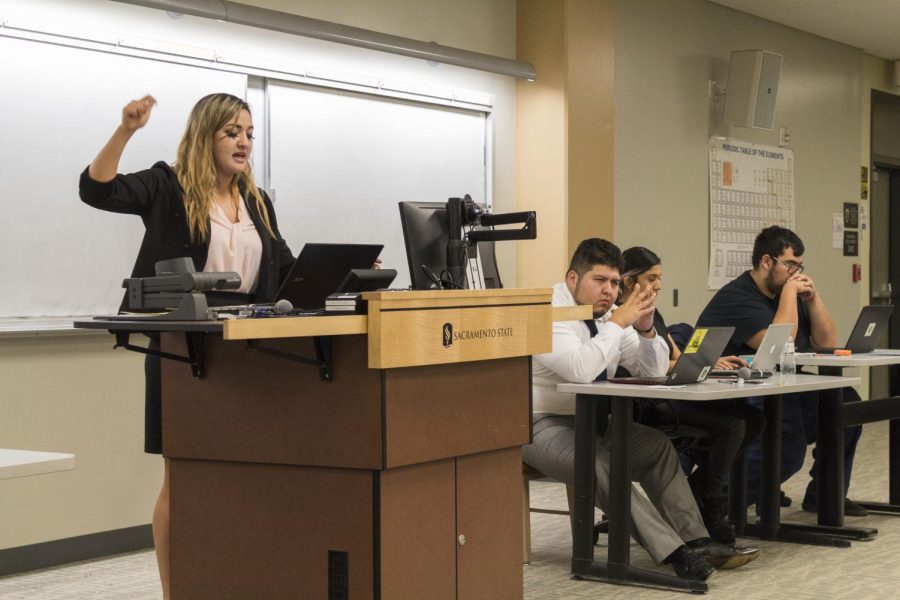Despite a ‘modest’ budget, debaters still find ways to succeed
Matthew Nobert – The State Hornet
Senior Kelly Buckland delivers her argument for the negative team about how college tuition should not be free at CSU’s during the Public Debate Associations fall public debate on Nov.16 at Sacramento State. The negative won the debate that students should pay for tuition.
November 24, 2017
Every Tuesday and Thursday afternoon, the Sacramento State Speech and Debate Team gathers to sharpen its argumentation skills, which have been incredibly effective against multiple first-place debaters, semifinalists and quarterfinalists so far this season, according to the team’s website.
This success is surprising for a team that has a disadvantage when it comes to their budget, especially when compared with other universities’ debate teams.
Speech and debate teams from universities throughout the nation search and battle for the top debaters by enticing its members with scholarships. For the Sac State debate team, however, this is not the case.
“A lot of universities have scholarships for their debate teams, and they have very large budgets, which means they go out just like an athletic director, and they recruit from high schools,” Kristen Tudor, the director of Sac State’s speech and debate team, said. “They offer scholarships, and they are getting the debaters with many years of experience. We don’t have scholarships, and we have a very modest budget.”
Despite this, Tudor said they are able to get people on the team by encouraging students who debated in high school and are attending Sac State to join. Tudor said the rest of the team is made up of walk-ons, which means they join the team as a class and start off at the novice level.
Students join the debate team by taking COMS 111, which is an upper-division course that counts toward elective units for communication studies majors, as well as upper-division General Education units for other majors, according to Tudor. The course description is described as “directed research in the current intercollegiate debate topic; intercollegiate debate topics, identification of issues, compilation evidence and case building”, as stated on the team’s website.
Ryan Bittle, a senior political science major, jokingly said this vague course description is sometimes a way for the team to recruit future debaters.
“A lot of people join the class on accident,” Bittle said. “They’re COMS majors trying to find a class and just click on that class because it is open. Then, they realized they joined the speech and debate team. Sometimes (when they find that out), they leave and drop. Other times, they stay, but that’s part of our recruiting tool ‒ by tricking them.”
Despite this, Bittle said when he first joined the team, it was composed of about 12 students. He said that the start of this semester, however, brought a full class list, something he has never seen before.
According to Tudor, debates are separated by three different levels. Novice, for example, is for beginners who have no prior debating experience. This allows students to improve their skills against equal competition ‒ something that debate coach Jared Anderson says brings an advantage to his team especially.
“Most of our walk-ons are junior(s) and seniors,” Anderson said. “A lot of the time, when (somebody) joins the novice division, (they) are against freshmen. It makes a difference because (they) have had those couple of years of (college) education.”
Tudor said the other two divisions are junior varsity and open. Junior varsity is for the debaters who are not quite good enough to be in open, while open division is for the top competitors, similar to varsity level in sports programs.
This season, Sac State debaters have been successful at each level, including junior communication studies major Kevin Ozomaro. So far, Ozomaro has gotten to at least the semifinals in four out of the five events he has competed in so far, including winning the open division at the Paul Winters Invitational at the University of Pacific, according to Anderson.
“I feel that I have been putting a lot of effort in getting better,” Ozomaro said. “Most of the credit should be going to Jared because he retaught me how to debate better.”
Kelly Buckband, a senior communication studies major, said that being on the team has helped her beyond just becoming a better debater.
“It pushes me to keep up with political decisions and politics in general,” Buckband said. “It pushes me to advance my learning in every aspect. It makes me more of a critical thinker and a lot more open-minded.”
According to the team’s website, there is one more event left in the fall 2017 season. The Steinbeck Invitational tournament will be held in Salinas during December and will be the last debate event before the team returns to action in the spring.
According to Tudor, the National Tournament is the biggest tournament of the year, which occurs during the spring. This year it is being held in Wisconsin, and due to its “modest” budget, the team can only afford to bring five debaters.
Despite this, Anderson said he hopes for his team to be competitive at a national level.
“My goal for the team is for us to be nationally competitive,” Anderson said. “I want us to be a team that schools have to think about and prepare for going to a tournament.. Ideally, we would like to be competing for national championships.”
Anderson said that while he hopes to compete nationally, he also wants his team to help students improve their academic skills.
“They get a lot faster at research, able to read through articles and consume information more critically,” Anderson said. “We got people from all sorts of spectrum of political opinions on our team. And as long as they can support their claims with research, evidence and logic, (and) whether I disagree or not, it is good for them. That is what debate is all about.”





























































































































